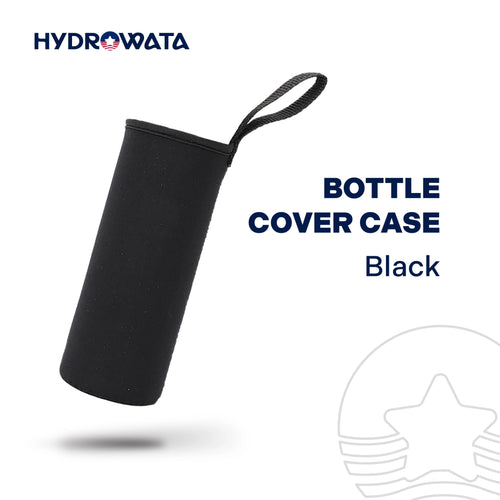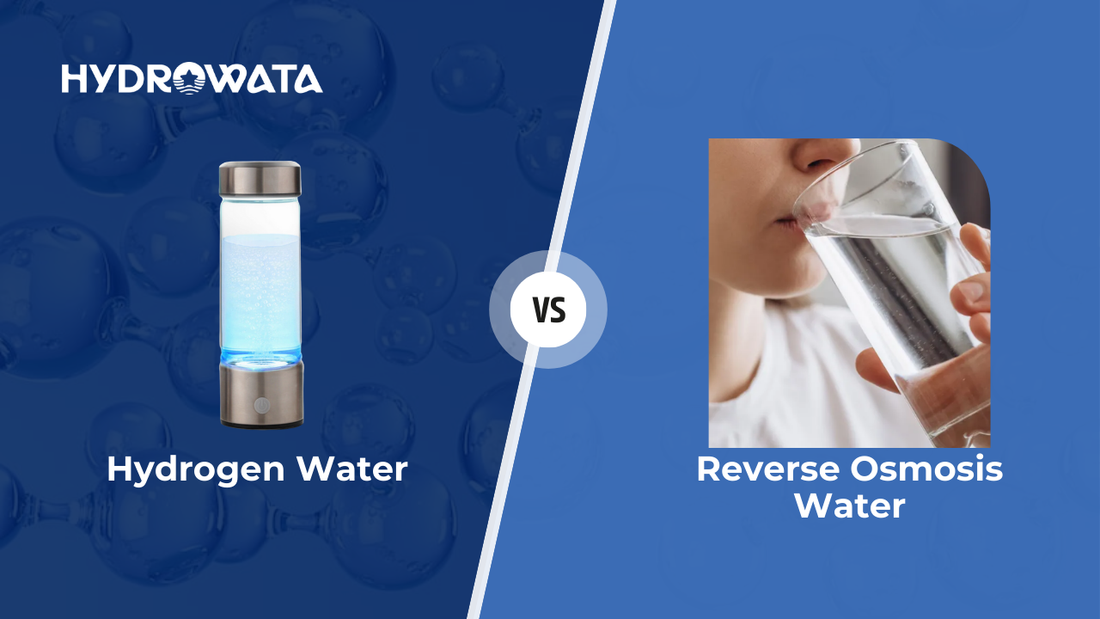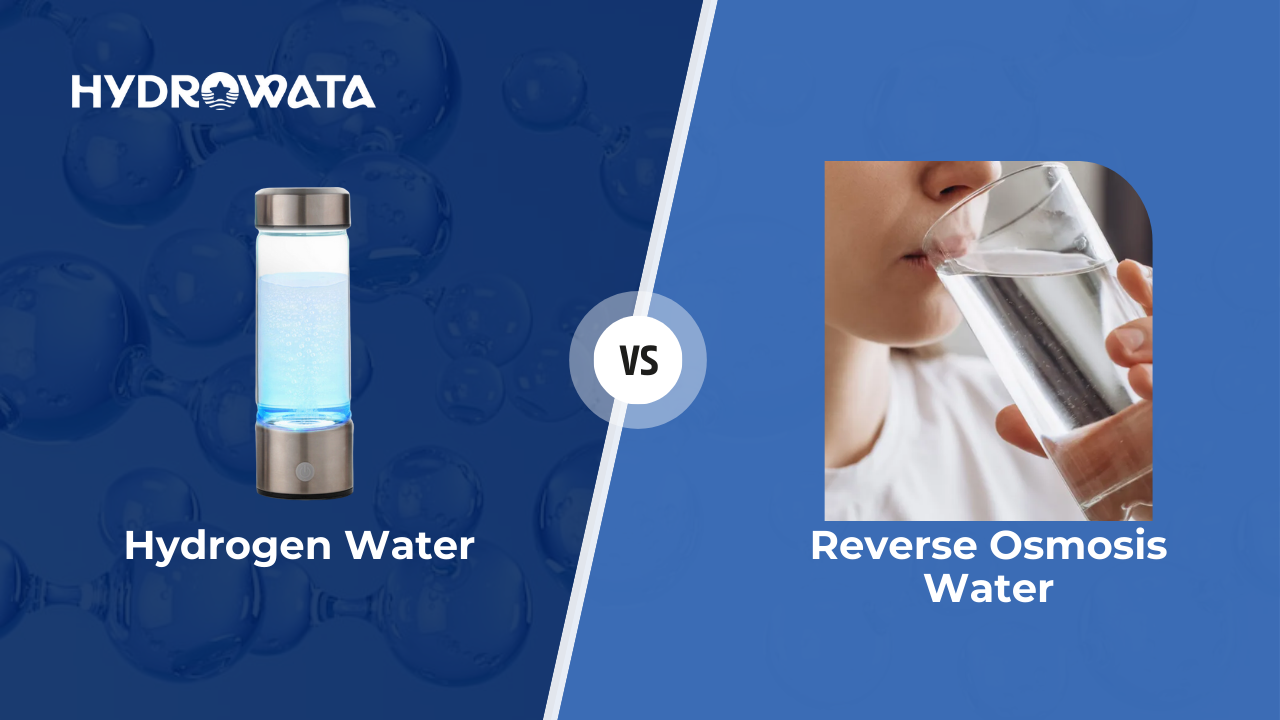Choosing the right type of water can have a significant impact on your health and hydration. Two popular options are hydrogen water and reverse osmosis (RO) water. While both promote clean, pure hydration, they differ greatly in how they are produced, their composition, and their potential health benefits.
Understanding these differences can help you make an informed decision about which water type suits your lifestyle and wellness goals best. In this article, we’ll explore what hydrogen water and RO water are, highlight their key differences, and help you decide which is right for you — focusing on the essential comparison of Hydrogen Water vs Reverse Osmosis.
What is Hydrogen Water?

Hydrogen water is regular water infused with molecular hydrogen (H₂) gas. This infusion is typically achieved through electrolysis, a process that generates hydrogen gas directly from water, allowing it to dissolve into the liquid. The growing interest in Hydrogen Water vs Reverse Osmosis often stems from hydrogen water’s unique antioxidant properties.
Unlike plain water, hydrogen water contains active hydrogen molecules, which are antioxidants that may help reduce oxidative stress and inflammation in the body. Many people consume hydrogen water for its potential health benefits, including improved energy levels, enhanced recovery after exercise, and better cognitive function. It’s gaining popularity as a functional beverage that goes beyond simple hydration.
What is Reverse Osmosis Water?

Reverse osmosis water is purified water produced through a filtration process that forces water through a semipermeable membrane. This membrane removes contaminants such as heavy metals, bacteria, viruses, chemicals, and dissolved solids. The result is highly purified water, often free of minerals and impurities.
RO water is prized for its cleanliness and safety, making it ideal for areas where tap water quality is poor. However, because RO filtration removes minerals, the water can sometimes taste flat or bland. Many users remineralize RO water to restore taste and essential minerals. When comparing Hydrogen Water vs Reverse Osmosis, this difference in mineral content is a key factor.
Hydrogen Water: Potential Benefits and Drawbacks
Hydrogen water is gaining attention for its unique health-promoting properties, but like any emerging wellness trend, it comes with both benefits and potential drawbacks. This section explores the key advantages and considerations of drinking hydrogen water.
Potential Benefits of Hydrogen Water
Hydrogen water, infused with molecular hydrogen gas, is gaining popularity for its potential health benefits. Known for its powerful antioxidant properties, this unique water may help reduce inflammation, boost energy, and support overall wellness. Here’s a quick look at the key advantages hydrogen water might offer.
Powerful Antioxidant Effects
Molecular hydrogen acts as a selective antioxidant, targeting the most damaging free radicals without interfering with beneficial reactive oxygen species. This helps protect cells from oxidative damage that contributes to inflammation and disease progression, a benefit often highlighted in Hydrogen Water vs Reverse Osmosis discussions.
Reduced Inflammation
Studies have shown that hydrogen water can help lower inflammation markers, making it potentially beneficial for individuals with inflammatory conditions such as arthritis, allergies, and even exercise-induced muscle soreness.
Enhanced Energy and Metabolism
By reducing oxidative stress, hydrogen water may improve mitochondrial function—the powerhouses of our cells—leading to increased energy production and improved metabolism.
Cognitive and Neuroprotective Benefits
Early research suggests that hydrogen water may help protect brain cells from oxidative stress and inflammation, potentially supporting cognitive function and reducing the risk of neurodegenerative diseases like Parkinson’s and Alzheimer’s.
Improved Athletic Performance and Recovery
Athletes use hydrogen water to minimize muscle fatigue and soreness post-workout. The antioxidant properties help speed recovery by reducing oxidative damage caused by intense physical activity.
Potential Drawbacks of Hydrogen Water
While hydrogen water offers promising health benefits, it’s important to consider some potential drawbacks in the Hydrogen Water vs Reverse Osmosis comparison.
Cost
Hydrogen water devices, such as hydrogen water bottles and generators, tend to be more expensive than standard water filters. Bottled hydrogen water can also be costly.
Hydrogen Stability
Hydrogen gas is very light and escapes easily from water over time. This means hydrogen water should ideally be consumed shortly after generation or purchase to gain the full benefits.
Not a Medical Treatment
Despite its benefits, hydrogen water should not replace prescribed medical treatments or be viewed as a cure-all.
Reverse Osmosis Water: Potential Benefits and Drawbacks
Reverse osmosis (RO) water is produced by forcing water through a semipermeable membrane that filters out contaminants, dissolved solids, and impurities. This technology is widely used in homes, industries, and municipalities to provide clean, safe drinking water, especially in areas where tap water may be contaminated or unsafe.
Potential Benefits of Reverse Osmosis Water
Reverse osmosis (RO) water is highly purified by removing contaminants, making it a popular choice for clean and safe drinking water. It offers several key benefits that improve water quality and protect health — important points in the Hydrogen Water vs Reverse Osmosis comparison.
Superior Purity
RO systems remove up to 99% of contaminants including heavy metals like lead and arsenic, chlorine, pesticides, bacteria, viruses, and dissolved salts. This makes RO water highly safe and reliable for drinking.
Improved Taste and Odor
By eliminating chlorine and many chemicals responsible for bad taste or smell, RO water generally tastes cleaner and fresher compared to tap water.
Health Safety for Vulnerable Individuals
For people with weakened immune systems, young children, or those living in areas with poor water quality, RO water offers significant protection against waterborne illnesses and harmful chemicals.
Versatile Applications
Beyond drinking, RO water is used for cooking, aquariums, laboratory work, and even in manufacturing, where purity is critical.
Ease of Use
Modern RO systems can be installed under sinks or attached directly to faucets, providing convenient access to purified water at home.
Potential Drawbacks of Reverse Osmosis Water
While reverse osmosis water is very pure, there are some downsides to consider — factors often discussed in Hydrogen Water vs Reverse Osmosis debates. These include mineral loss, water wastage, and maintenance needs, which may impact taste and long-term use.
Removal of Beneficial Minerals
The filtration process strips water of minerals like calcium, magnesium, and potassium, which are essential for health. Prolonged consumption of demineralized water may require remineralization or dietary supplementation.
Water Wastage
Traditional RO systems often waste 3 to 4 gallons of water for every gallon purified, raising environmental and cost concerns. More efficient systems are available but tend to be pricier.
Flat or Bland Taste
Because of mineral removal, RO water can taste flat or bland, which some people find less enjoyable. Some users opt for mineral cartridges to improve taste.
Maintenance and Upkeep
RO filters and membranes need regular replacement (every 6-12 months), adding to ongoing maintenance costs and effort.
Initial Cost and Installation
Setting up an RO system can be costly upfront and might require professional installation.
In conclusion, RO water offers unmatched purity and safety, making it an excellent choice where water quality is a concern. However, users should consider mineral depletion and environmental impact when choosing RO water, especially when comparing Hydrogen Water vs Reverse Osmosis options.
Hydrogen Water vs. Reverse Osmosis: Key Differences

Hydrogen water and reverse osmosis (RO) water serve different purposes and are produced using distinct technologies, leading to several important differences. This section highlights the primary contrasts in the ongoing Hydrogen Water vs Reverse Osmosis discussion:
| Feature | Hydrogen Water | Reverse Osmosis Water |
|---|---|---|
| Production Method | Electrolysis infuses water with hydrogen gas | Water forced through semipermeable membrane to remove impurities |
| Composition | Contains dissolved molecular hydrogen; retains natural minerals | Highly purified, stripped of most minerals and contaminants |
| Primary Benefit | Antioxidant and anti-inflammatory properties | Removes contaminants for safe, clean drinking water |
| Health Effects | Potential to reduce oxidative stress and improve recovery | Provides contaminant-free water, reducing risk of waterborne illness |
| Taste | Often fresh with subtle mineral presence | Can taste flat or bland due to mineral removal |
| Cost | Generally higher due to technology and devices | Moderate, depending on system size and maintenance |
| Usage | Specialty beverage for health-conscious users | Common household water purification method |
Which One Should You Choose?
Choosing between hydrogen water and reverse osmosis water depends on your priorities. If you want purified, contaminant-free water primarily for safety, RO water is a reliable choice. However, if you’re interested in additional health benefits like antioxidant support and enhanced recovery, hydrogen water may be worth the investment.
Consider your water source, health goals, and budget when making your decision. This key choice often comes down to the Hydrogen Water vs Reverse Osmosis benefits that matter most to you.
Introduce HydroWata Hydrogen Water Bottle

HydroWata is a cutting-edge hydrogen water bottle that uses advanced electrolysis technology to infuse your water with molecular hydrogen quickly and efficiently.
Portable and user-friendly, HydroWata allows you to enjoy fresh hydrogen-rich water anytime, anywhere. Its sleek design and BPA-free materials make it a healthy and environmentally conscious choice. HydroWata generates an unlimited supply of hydrogen on demand, ensuring every sip is packed with antioxidants to support your wellbeing.
Whether you’re an athlete, busy professional, or health-conscious individual, HydroWata simplifies access to hydrogen water without the need for complicated setups. It’s a perfect solution for those weighing the benefits in the Hydrogen Water vs Reverse Osmosis conversation.
Benefits of Using HydroWata Hydrogen Water Bottle
The HydroWata hydrogen water bottle offers a convenient way to enjoy the health benefits of hydrogen-rich water anytime, anywhere. Designed with advanced features, it enhances your hydration routine while supporting overall wellness.
Fresh, Antioxidant-Rich Water Every Time
HydroWata generates molecular hydrogen on demand, infusing your water with antioxidants that help neutralize harmful free radicals. This reduces oxidative stress and inflammation, supporting overall health, improving energy levels, and speeding up recovery after exercise — a unique advantage in the Hydrogen Water vs Reverse Osmosis comparison.
Supports Mental Clarity and Focus
Drinking hydrogen-rich water has been linked to enhanced cognitive function. By combating oxidative stress in brain cells, HydroWata may help improve mental clarity, focus, and reduce fatigue during busy days.
Portable and Convenient Design
The sleek, lightweight design of HydroWata makes it easy to carry with you anywhere — at work, gym, or outdoors. This ensures you have access to hydrogen-rich water throughout the day, helping you stay consistently hydrated with enhanced benefits.
Made with Safe, BPA-Free Materials
HydroWata is crafted from durable, BPA-free materials that ensure your water stays pure and safe from harmful chemicals often found in plastic bottles. This adds peace of mind for your health and safety.
Eco-Friendly and Cost-Effective
By generating hydrogen water on demand, HydroWata eliminates the need to buy expensive bottled hydrogen water, reducing plastic waste and saving money over time.
Transforms Everyday Hydration into a Wellness Routine
Using HydroWata turns simple water drinking into a functional health practice, combining hydration with powerful antioxidant support, enhancing your overall wellness with minimal effort.
Conclusion
Both hydrogen water and reverse osmosis water offer distinct benefits. While RO water excels in purity and safety, hydrogen water provides added antioxidant advantages that promote overall health. The HydroWata hydrogen water bottle is an excellent option for those seeking a convenient way to enjoy hydrogen-rich water daily.
Ultimately, the best choice depends on your individual needs, preferences, and lifestyle. Whichever you choose, staying well-hydrated is key to maintaining good health and understanding the nuances of Hydrogen Water vs Reverse Osmosis can guide you in making the best decision.
FAQs
1. Does hydrogen water taste different from regular water?
Hydrogen water typically tastes similar to regular water but may have a slightly fresher or smoother taste due to the dissolved hydrogen and retained minerals, a point often discussed in Hydrogen Water vs Reverse Osmosis comparisons.
2. Is reverse osmosis water safe to drink daily?
Yes, RO water is safe to drink daily but may lack essential minerals, so some people choose to remineralize it.
3. How often do I need to clean the HydroWata bottle?
HydroWata recommends regular cleaning every few uses to maintain optimal hydrogen production and hygiene.
4. Can hydrogen water replace regular water intake?
Hydrogen water can complement regular hydration but should not completely replace plain water unless hydrogen water is your primary source.
5. What makes HydroWata different from other hydrogen water bottles?
HydroWata stands out for its advanced electrolysis technology, portability, BPA-free materials, and continuous on-demand hydrogen production — key features to consider in the Hydrogen Water vs Reverse Osmosis discussion.





